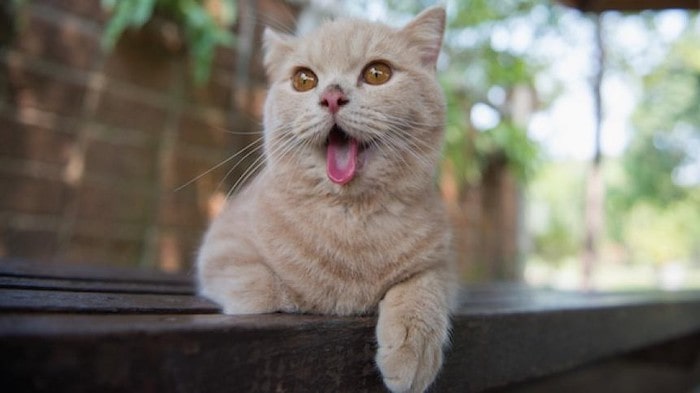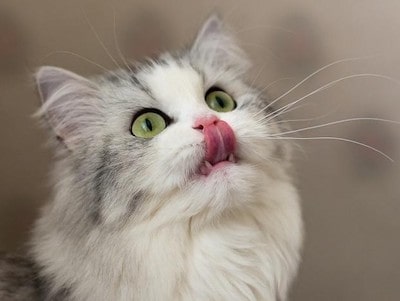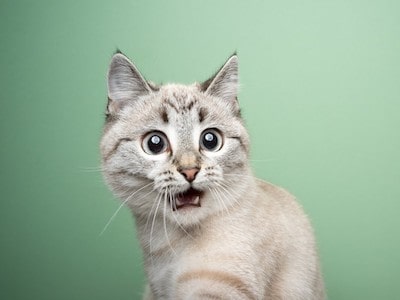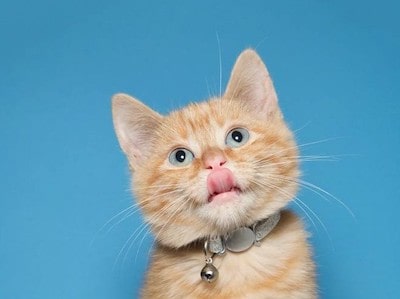If you’ve ever observed your cat smacking its lips, you may have wondered what lies behind this curious behavior. In today’s article, we aim to demystify the question: Why do cats smack their lips?From their ancestral instincts to potential health concerns, we will explore the various reasons why our feline friends engage in this intriguing action.
So, whether you’re a seasoned cat owner or simply intrigued by the fascinating world of cats, join us as we embark on a journey to uncover the secrets behind this peculiar habit. Get ready to gain a deeper understanding of your furry companion and decode the enigma of cat lip smacking.
What Does Lip Smacking Mean in Cats?
Lip smacking in cats is when they move their mouths, causing a smacking sound when their lips come together. While lip smacking, your cat might also move and flick their tongue. You might also notice the tip of their tongue poking out in a rather cute-looking gesture known as ‘blepping.’

Lip smacking is a normal behavior in most cats. Some cats lick or smack their lips after a delicious meal, while others might display this odd behavior while they sleep. Generally, this behavior should not cause you any concern, unless the cat repetitively licks her lips even while awake.
Common Causes of Lip Smacking in Cats
There are many possible causes of lip smacking in cats, ranging from benign to serious. Here are some of the most common ones:
Hunger or anticipation of food
Some cats may smack their lips when they are hungry or excited about food. This is because they are salivating and preparing their mouth for eating. You might notice your cat smacking their lips when you open a can of wet food or when they smell something tasty.
Nausea or digestive issues
Cats that are nauseated or have digestive problems can also smack their lips excessively. This is because they are trying to swallow the excess saliva that is produced by their stomach irritation. They may also drool, vomit, or lose their appetite2. Some common causes of nausea or digestive issues in cats are:
- Hairballs
- Ingestion of foreign objects
- Food intolerance or allergies
- Parasites
- Inflammatory bowel disease
- Pancreatitis
- Liver or kidney disease

Dental problems or oral pain
Cats with dental problems or oral pain can also indulge in excessive lip licking or smacking. This is because they are trying to find a comfortable position for their mouth or soothe their discomfort. They may also not eat well, lose weight, and/or drool. Some common causes of dental problems or oral pain in cats are:
- Tartar buildup
- Gingivitis
- Broken teeth
- Oral ulcers
- Stomatitis
- Oral tumors
Stress or anxiety
Cats sometimes lip smack when they are anxious or stressed. This is called a displacement behavior, which means they try to relieve their anxiety by doing something else such as lip smacking or over-grooming. Cats do this to try and help themselves calm down. Some common sources of stress or anxiety in cats are:
- Changes in the environment
- New people or pets
- Loud noises
- Lack of resources
- Separation anxiety
- Boredom
Curiosity or interest
Cats may also lip smack when they are curious or interested in something. This is because they are using their sense of smell and taste to explore their surroundings.
Cats have a special organ called the vomeronasal organ (VNO) that allows them to detect pheromones and other chemical signals from other animals or objects.
You might notice your cat smacking their lips when they sniff something new or intriguing.
Tips to Prevent or Reduce Lip Smacking in Cats
Depending on the cause of your cat’s lip smacking, there are different ways to prevent or reduce it. Some of the general tips are:
1) Take your cat to the vet for regular dental check-ups and treatments. Your vet can examine your cat’s mouth and teeth and diagnose and treat any dental problems that may cause lip smacking. Your vet can also advise you on how to brush your cat’s teeth and what kind of dental products or chews to use to keep their mouth healthy and clean.
2) Feed your cat a balanced and high-quality diet that suits their needs and preferences. Your vet can recommend you the best type and amount of food for your cat based on their age, weight, activity level, and health condition.
You can also try to avoid foods that may trigger allergies, intolerance, or poisoning in your cat, such as dairy, chocolate, grapes, onions, garlic, or xylitol. You can also provide your cat with fresh water and a clean litter box at all times to prevent dehydration or urinary problems that may cause lip smacking.

3) Enrich your cat’s environment with toys, scratching posts, hiding places, and interactive play sessions. Cats need mental and physical stimulation to stay happy and healthy.
By providing them with various sources of entertainment and exercise, you can prevent or reduce boredom, stress, or anxiety that may cause lip smacking.
You can also reward your cat with treats or praise when they play or behave well to reinforce their positive behavior.
4) Reduce your cat’s stress and anxiety by creating a safe and comfortable space for them and avoiding sudden changes or loud noises. Cats are sensitive to changes in their environment and may feel threatened or insecure by them.
By creating a safe and comfortable space for your cat, such as a cozy bed, a warm blanket, or a cardboard box, you can help them feel more relaxed and secure.
You can also try to avoid sudden changes or loud noises that may stress or scare your cat, such as moving house, introducing new pets or people, or setting off fireworks. If you have to make a change or expose your cat to a noise, you can do it gradually and gently to help them adjust and cope.
5) Use products or remedies that may help with lip smacking in cats, such as dental chews, anti-nausea medication, calming supplements, or catnip. There are various products or remedies that may help with lip smacking in cats depending on the cause. For example:
- Dental chews: These are edible treats that are designed to clean your cat’s teeth and gums by scraping off plaque and tartar as they chew. They can also freshen your cat’s breath and reduce inflammation or infection in their mouth. You can give your cat dental chews as a snack or reward once or twice a day.
- Anti-nausea medication: These are drugs that are prescribed by your vet to prevent or treat nausea or vomiting in your cat. They can also reduce inflammation or irritation in your cat’s stomach or intestines. You can give your cat anti-nausea medication as directed by your vet before or after meals or when they show signs of nausea or vomiting.
- Calming supplements: These are natural products that contain ingredients such as chamomile, lavender, valerian, or melatonin that can help calm your cat’s nerves and reduce stress or anxiety. They can also improve your cat’s mood and sleep quality. You can give your cat calming supplements as directed by the manufacturer before or during stressful situations or as a daily supplement.
- Catnip: This is a herb that belongs to the mint family that can stimulate your cat’s senses and make them feel happy and playful. It can also reduce stress or anxiety in some cats. You can give your cat catnip as a toy (e.g., a stuffed mouse), a spray (e.g., on their bed), or a dried herb (e.g., in their food) once or twice a week.
When to Seek Professional Help for Lip Smacking in Cats
Sometimes, lip smacking in cats can be a sign of a serious health problem that requires immediate medical attention. Some of the signs and symptoms that indicate that your cat’s lip smacking may be more than just a harmless habit are:
- Drooling, bleeding, swelling, or bad breath from the mouth: These can indicate a severe dental problem, such as an abscess, a tumor, or a foreign object stuck in the mouth. They can also indicate an oral infection, such as feline calicivirus or feline immunodeficiency virus. These conditions can cause pain, inflammation, difficulty eating or drinking, or even life-threatening complications.
- Loss of appetite, weight loss, dehydration, or lethargy: These can indicate a serious digestive problem, such as a blockage, an ulcer, or a cancer. They can also indicate a systemic disease, such as kidney disease, liver disease, diabetes, or hyperthyroidism. These conditions can cause malnutrition, dehydration, organ failure, or even death.

- Frequent vomiting, diarrhea, constipation, or blood in the stool: These can indicate a chronic digestive problem, such as inflammatory bowel disease, pancreatitis, or colitis. They can also indicate a parasitic infection, such as roundworms, tapeworms, or giardia. These conditions can cause irritation, inflammation, damage, or bleeding in the stomach or intestines.
- Aggression, fearfulness, or isolation from other pets or people: These can indicate a psychological problem, such as depression, anxiety, or phobia. They can also indicate a neurological problem, such as epilepsy, brain tumor, or stroke. These conditions can affect your cat’s mood, behavior, or cognition.
FAQs
Is lip smacking in cats a cause for concern?
Lip smacking alone is not always a cause for immediate concern. However, if you notice excessive or persistent lip smacking, along with other signs such as drooling, loss of appetite, or changes in behavior, it may indicate an underlying health problem. In such cases, it is advisable to consult a veterinarian for a thorough examination and appropriate guidance.
Are there any behavioral reasons behind lip smacking in cats?
Lip smacking can sometimes be a behavioral response in cats. It may occur during grooming sessions, especially after eating or drinking, as cats clean their lips and whiskers. Lip smacking can also manifest in situations where cats feel anxious, stressed, or overstimulated. Identifying the triggers and providing a calm and enriching environment can help address behavioral lip smacking.
Are there any home remedies to alleviate lip smacking in cats?
Home remedies may not directly address the underlying cause of lip smacking, but there are steps you can take to promote oral health and reduce potential discomfort. These include providing a balanced diet, regular brushing of your cat’s teeth, using dental treats or toys, and maintaining a stress-free environment. However, it’s important to consult with a veterinarian for a proper diagnosis and guidance for your specific cat’s needs.
Can medications help with cat lip smacking?
Medications can play a role in managing lip smacking in cats, particularly if it is linked to anxiety, stress, or underlying health conditions. Only a qualified veterinarian can prescribe medications based on a thorough evaluation of your cat’s health and behavior. It’s essential to follow professional guidance and never administer medications without veterinary advice.
Well, That’s a Wrap
Lip smacking is a common behavior among cats that can have various meanings and causes. Sometimes, it is a normal and natural part of their communication and behavior. Other times, it can indicate a problem, such as a dental issue, a digestive disorder, or a psychological distress.
By understanding your cat’s lip smacking, you can improve your bond with them and ensure their health and happiness. You can also prevent or reduce lip smacking in cats by providing them with the best care possible, such as regular dental check-ups and treatments, a balanced and high-quality diet, an enriched and stimulating environment, a safe and comfortable space, and products or remedies that may help with lip smacking.
If you notice any signs or symptoms that suggest that your cat’s lip smacking may be more than just a harmless habit, you should seek professional help immediately. Your vet can diagnose and treat the underlying cause of your cat’s lip smacking and help them recover.
